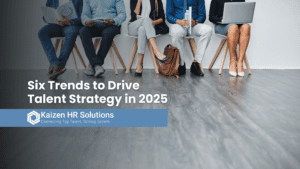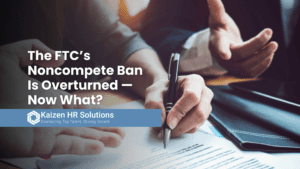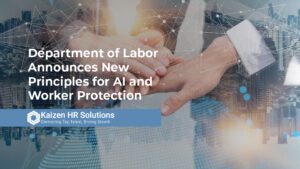At Kaizen HR, we are continually staying on top of HR trends to provide you with the latest insights to make the right decisions for your team. With 2024 on the horizon, it’s the ideal time to look ahead and understand some of the top trends likely to be affecting HR in the coming year.
The workplace experts at Gartner have released their annual Top 5 Priorities for HR Leaders in 2024 report. We are here to help you decipher these upcoming trends – and how you can incorporate them into your strategy.
Leader & Management Development
75% of HR leaders report that managers are overwhelmed by increasing job responsibilities, while 73% believe their organization’s leaders and managers aren’t equipped to lead change. It’s the effect of a leadership development approach that has traditionally been more skills-based and, as a result, has failed to address the true challenges facing managers today, which range from overloaded responsibilities, “busy work”, and in some cases, a lack of desire to be in their current managerial roles.
Instead, HR teams should rethink what management and leadership roles truly look like. Resetting role expectations and simplifying managerial tasks can have a notable impact on the success of managers, as can investing in developing managerial habits, rather than just “skills” Is also crucial. Additionally, focusing on building a strong leadership pipeline – and letting prospective leaders explore for themselves whether they feel like management is the right career path for them, rather than presenting it as a “done deal” or expectation.
Organizational Culture
Culture has become a major sticking point in today’s work-anywhere world. According to 41% of HR leaders, employees’ connection to their company culture is compromised (weakened???) by hybrid work, and 47% acknowledge that they don’t know how to drive the change needed to achieve the desired culture. Hybrid work has offered many benefits to employees, but it also presents many cultural challenges, as leaders struggle to ensure their teams are both aligned with and connected to the overall culture of the organization.
Instead of viewing the hybrid disruption as a negative, HR teams can look at it as an opportunity to diffuse culture in different ways. Emotional proximity can become a focus, rather than assuming physical proximity will suffice, and organizations can work to optimize micro-culture to take advantage of the smaller, more intense experiences that tend to form around remote and hybrid work. Ultimately, this approach can foster a “culture anywhere” style that encourages employees to engage, be productive, and drive purpose.
HR Technology
60% of HR leaders are uncertain about the impact of evolving technology trends, such as generative AI, on HR and talent. They also acknowledge that their HR technology solutions and strategy do not match their current and future business needs, such as digital transformation. While there’s significant hype and chatter around certain technologies, such as generative AI, the rapid pace of transformation – and the uncharted territory in terms of laws, regulations, and ethics – makes it challenging for HR leaders to know where to focus and what actions to take.
Gartner suggests developing a framework to distinguish the true capabilities and potential of new technology, then assess its potential impact with factors like governance, workforce readiness, and others. The key is to balance the need to evolve with the need to fully understand the impact of new tech, ensuring that any technology adoption is handled with care and consideration for the people impact as well as cost, legal, and ethical effects
Change Management
Change has been the one constant over the last few years, but it’s taken its toll. 77% of HR leaders say their employees are feeling fatigued, and 82% of HR leaders state their managers aren’t equipped to lead through change. Specifically, employees have reported fatigue over excessive change, which in turn has led to lower productivity, more risk of turnover, and lower performance overall.
Addressing the roller coaster of change requires HR leaders to look for ways to establish more stability and resilience. Build fatigue management – through solutions like facilitating empathy, open conversations, and understanding of fatigue drivers – into the change management framework. It’s about equipping everyone, from leaders and on-the-ground employees, to recognize what’s causing fatigue and to have the tools necessary to combat it.
Career Management & Internal Mobility
A strong sense of career development is one of the biggest deciding factors in whether employees choose to stay in the long term. And yet, 89% of HR leaders believe career paths at their organizations are unclear for many employees, while 66% admit the career paths that do exist within their organizations are not compelling for many employees. Traditional career maps are no longer as relevant, and many employees are struggling to muddle through confusion.
Instead, look for ways to make career pathing more adaptive and dynamic. Employees seek to build genuine experience and understanding, not just to “get information.” Therefore, it’s important to develop tools and touchstones they can use to get a better sense of their potential career trajectories. When employees feel confident and empowered, they are more capable of driving their own success – with the support of an organization that’s invested in their growth.
By Rose Dorta

Are you a high-performing leader or believe you have the potential to tackle a more challenging role? Would you be interested in career opportunities that are seeking these attributes?
I’d love to chat with you and answer any questions that you have. Email me, Rose Dorta, Managing Director of Kaizen HR Solutions, here.







